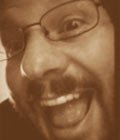Welcome from
Eric O. Ledermann
twitter.com/ericledermann
facebook.com/ericledermann

Hey! Thanks for stopping by. Pour yourself a cup o' jo, take a load off your feet, and check out what's here. You are looking at my ramblings about issues of faith, life and culture—they are my own and are not necessarily shared by those with whom I work, live or otherwise engage.
Heck, a week from now I may not even agree with what I write here! The Spirit of God is always moving; always shaping and reshaping, transforming and re-forming, each of us according to God's hope and vision for humanity. I hope we may be able to listen, pay attention, and respond faithfully. To steal a phrase from our UCC sisters and brothers: "God is still speaking."
Feel free to share your comments and engage in any conversation that may be happening here, but just know that I do reserve the right to delete any spam or anything I deem inappropriate or offensive. I look forward to dialoguing with anyone who cares to dialogue!
Peace and blessings,

|
|
This is the third and final part in a three part response to the Rev. Landon Whitsitt’s new book, Open Source Church: Making Room for the Wisdom of All. You can see my other two posts (much shorter and incomplete) here and here. Some of what I write here may be repetitive, but the following is written after reading the entire book and the other posts were as I was reading it.
I continue to find myself intrigued by Whitsitt’s concept of the Church being an open source community, much like those who have devoted themselves to building and improving Wikipedia, the renowned online encyclopedia that seeks to collect the “sum of all human knowledge.� The idea that the Church is a place where anyone can plug in and contribute has been a long-held desire for those who gather, but it has been a challenging concept [...]
Ok, so the farther I get into Landon Whitsett’s book, Open Source Church, the more I think I’m beginning to see the vision he is proposing. But I wonder if there needs to be a balance between honoring the traditions that have informed our way of being the Church and seeking new ways of living into God’s vision for the Kingdom here on earth.
He writes: “I can edit the worlds biggest encyclopedia, but I can’t edit the church.�
Well, yes and no. When someone walks through the doors, they have no way of knowing the reason behind the things a community does or how it functions. I am certainly not saying that all those ways are good and healthy. But, often before a therapist can fully understand how to help someone to move beyond their stuckness, the therapist has to have some idea of how that [...]
I must first state that I am thankful for Landon Whitsitt’s contribution to the ongoing conversation around the questions: what has the church become and what might it be becoming? This is especially poignant given his position as vice-moderator of the General Assembly of the Presbyterian Church (USA). So much is happening to the ecclesial landscape that is difficult to even wrap my head around the varied directions within the PC(USA), let alone the entire Christian landscape here in the U.S. and around the world. I think a critique is important and much needed, and Landon offers not only that in his new book, Open Source Church: Making Room for the Wisdom of All, but also a vision for a different way of doing things. It is compelling, but I’m not sure he and I see the same things in churches (though, I admit, [...]
|


